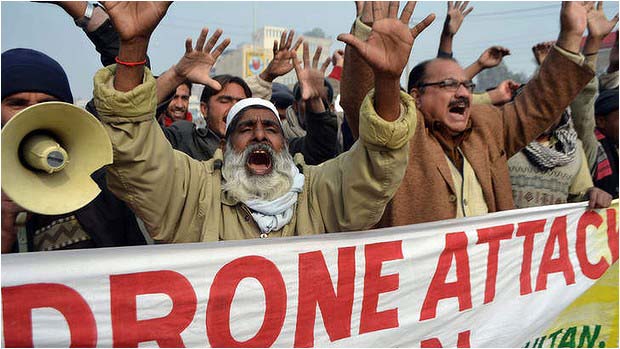By Raza Rumi
The recent drone strike in Pakistan’s northwest has eliminated an enemy of the state and his close associates. Hakimullah Mehsud’s death in North Waziristan has shaken the loose alliance of Tehrik-e-Taliban Pakistan (TTP). In any other country, the security policy managers would have capitalized such an opportunity. Not in Pakistan. In fact the reaction from the political parties, which had recently vowed to hold talks with TTP to secure peace, are alarming to say the least. Despite the great urge of politicians to hold talks, there were murmurs that the military may not be too excited about this development even though the COAS Gen Kayani gave his public assent saying that the army was following the political consensus. A PTI leader recently posted on social media that there was only a 40% chance of success for a military operation. However, the party stalwarts on social media later refuted this claim.
Independent security experts and political commentators have been highlighting that the simplistic, populist solution of talks-will-lead-to-peace was designed to fail. Whom would the government negotiate with? What would be the conditions? Would the TTP end its terror attacks against Pakistani state and its citizens? All of these questions were unanswered. Yet, Hakimullah’s death has invited a barrage of reactions from politicians and right wing media that the latest drone strikes were a murder of peace.
Interior Minister, Chaudhry Nisar’s press conference and speeches in the Parliament later have set a new record of appeasement and adopting an easy way out by bashing the US. He announced a set of measures aimed at protesting the drone strikes and review all aspects of Pakistan-US relations. PTI Chairman Imran Khan, who is the pioneer of the talks mantra, has threatened to stop NATO supplies after November 20 if the drone strikes are not stopped. The simple question that needs to be asked is that how can Pakistan equate the deaths of its soldiers at Salala with the elimination of a private militia head who was responsible for dozens of terrorist attacks killing so many Pakistanis and security personnel? Even the death of a brave General Niazi did not invoke such outrage. This does not augur well for Pakistan as it endeavours to chart its security course in the wake of NATO drawdown from Afghanistan.
The Constitution of Pakistan is clear. Article 256 states: No private organisation capable of functioning as a military organisation shall be formed, and any such organisation shall be illegal. The Parliament can change this clause if it so wishes but until it remains as part of the document, its sanctity cannot be violated in the rush to make populist gains. By implication, the appeasement of a militia and honoring its killed leader as an ambassador of peace is plainly unconstitutional. The religious parties have taken this narrative to further heights. Jamaat-e-Islami head has termed Hakimullah a shaheed (martyr). The maverick Maulana Fazlur Rehman who is not averse to lobbying with Americans for power (WikiLeaks revealed his parleys with US officials) has stated that even if a dog is killed by the US, he would call it shaheed.
In its five months of governance, the PML-N has been unable to set the direction for Pakistan’s security policy. It is driven by the short-term concerns that Imran Khan its chief opponent may not take political mileage from spinning peace-through-talks policy. Secondly, anti-Americanism sells and the PML-N wants to adopt this narrative as it is fearful of ceding space to its political opponents. Finally, the uncertainty in Afghanistan necessitates buying time by the civil-military elites, as they would only carve a clear policy until the US exit plans are clearer. A decision on the private militias is unlikely before that.
This gerrymandering is harming Pakistan’s economy and also making it a schizoid state. One the one hand it wants to engage with the world and seek benefits and on the other it wants to drum up isolationism as a political slogan. Such narrative is also affecting the national mindset which is turning xenophobic and promoting high tolerance levels for violence against civilians. More worrying is that the fact that a state under attack is not willing to confront the grave dangers to its existence.
We are turning into victims of our faux narratives. Rational policy options require calibrated strategy of engagement and military action. Both these strategies could inform a counter-terrorism emergency plan which is nowhere in sight. It seems that the recently restructured National Security Council is a phantom body in need of political will, energy and clarity. If anything, PM Sharif will have to rethink the choices he has made. The office of National Security Advisor is perhaps the most critical which needs to give informed policy options and lead the intra-state discourse on national security. The few months of Mr Sartaj Aziz’s performance have been far from satisfactory. Nawaz Sharif has to be seen as the man in charge and without capable advisers he may not be able to achieve this. Pakistan seems to have reached close to an abyss and it is the civilians who must rise to the occasion.
– See more at: http://www.thefridaytimes.com/tft/at-the-abyss/#sthash.QtmCMlle.dpuf



